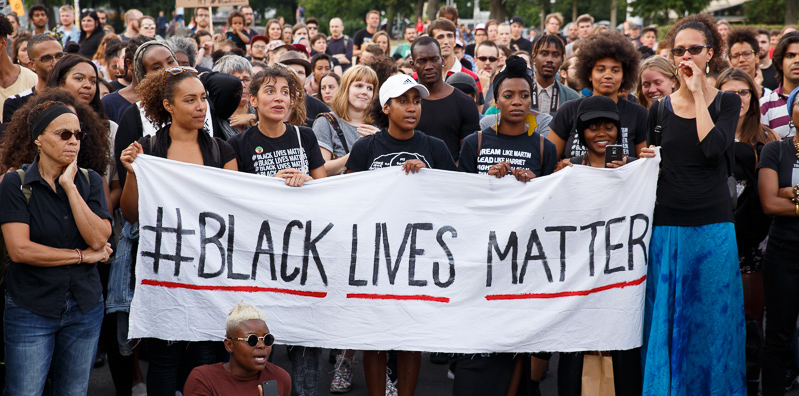

Alicia Garza, one of the founders of #BlackLivesMatter (BLM) and the Black Lives Matter Global Network, talked about the history and accomplishments of the BLM movement and stressed the importance of continuing to amplify Black voices and leadership while addressing students on campus.
During the event on Nov. 1, Garza, along with Rosemary Ndubuizu, an assistant professor of African American studies at Georgetown, discussed the historical and current role of BLM. The event was hosted by the Georgetown University Lecture Fund and sponsored by the department of African American studies, Justice and Peace Studies Program and Culture & Politics Program.
According to Garza, the BLM movement signifies the empowerment of Black voices and leadership.
Garza reflected on the impact of the BLM movement and mentioned, “It’s easy for us to get nihilistic. The reality is that BLM, the movement, is one of the most consequential social movements of our time.”
She also highlighted how the BLM movement has elevated discussions of race to national levels, shedding light on the systemic racism experienced by Black people and other people of color.
Garza emphasized that the BLM movement serves as a platform for individuals to drive social change in their communities. She referenced a message she received from a professor in Indiana who expressed interest in creating a BLM curriculum.
According to Garza, promoting equitable voting access and voting rights are among the top priorities of the BLM movement.
She addressed the challenges posed by political efforts to limit Black voices in the voting process, such as strict voter ID laws and restrictions on providing water or food to voters waiting in line. In addition, Garza discussed the issue of racial gerrymandering as a means for politicians to suppress voices in communities not aligned with their agendas.
Garza’s motivation for engaging in social justice work stems from her desire to address the challenges faced by marginalized communities. She expressed, “I came into organizing movements and social change work because I was mad and wanted something to be different because I was also hopeful. My goal is to shift our conditions for the better.”
One Georgetown student, Elizabeth Foster (CAS ’27), attended the discussion to gain insights into BLM’s role in social movements and the strategic approaches to driving social change, including the efforts to gauge politicians’ perspectives on BLM.
Kumail Zaidi (SFS ’24), the Lecture Fund’s vice chair of diversity, equity and inclusion and the primary organizer of the event, highlighted the importance of Garza’s message in a world filled with challenges. He underscored the significance of maintaining hope in the realm of politics and the value of organizing a global movement.
Garza stressed the importance of maintaining optimism and joy while pursuing social change through movements. She emphasized, “Movements should be joyful. With that being said, it doesn’t mean that everything is supposed to feel good all of the time. There’s a difference between acknowledging that we have joy in our lives at the same time that there are really ugly things happening that are despicable.”




